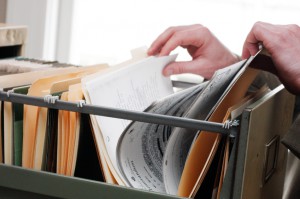Beginning the Divorce Process: Essential Documents Needed for Divorce

Once you have decided to divorce, an essential first step to take is to gather together all the many financial documents and legal records that will be needed as you move forward with the divorce process in New Jersey. Your goal in collecting this information is to create the most complete and accurate picture of your income, the assets and debts you accumulated as a couple, and normal household expenses.
Preliminary documents and records to gather include:
Proof of Income and Investments for the Past One to Three Years
– W-2 statements for the past three to five years for you and your spouse,
– Three most recent paystubs from your employer,
– State and federal individual and business income tax returns,
– Monthly bank statements for all joint and individual accounts,
– Monthly statements for all stocks, bonds and mutual funds any trust documents affecting you, your spouse, or your children,
– Documents showing income on any investment properties, such as rent receipts, and
– Account statements for annuities, certificates of deposit, 529 accounts, UTMA/UGMA accounts, or other financial records.
Property Ownership
– Deeds and purchase documents for your primary residence,
– Deeds and purchase documents for any other real property holdings, including rental properties or vacation homes,
– Ownership documents for any business property owned partially or fully by either you or your spouse, with evidence of percentage ownership,
– Purchase documents or appraisals for any personal property of significant value (antiques, collectables, jewelry, art, furs, etc.),
– Registration certificates or title documents for automobiles or other vehicles, and
Documents evidencing separate ownership of property by either spouse, including a list of property owned prior to marriage, a list of any purchases made with such property, and any documents evidencing an inheritance by either spouse.
Bills and Outstanding Debt for the Past One to Three Years
– Property tax statements,
– Mortgage statements,
– Credit card statements, whether joint or individual,
– Vehicle or equipment leases,
– Tax liens or notices from the IRS,
– Utility bills,
– Student loan documents or tuition bills,
– Any other loans or notes payable,
– Outstanding medical bills,
– Arrearages on prior spousal or child support orders or agreements, and
– Monthly budget worksheets (Quick Books, Quicken, Case Information Statement).
Legal Documents
– Any documents already filed in court,
– Any court papers you have been served with,
– Any prenuptial or marital agreements,
– Wills,
– Living wills,
– Powers of attorney,
– Advance healthcare directives or healthcare proxies,
– Pre-nuptial or post-nuptial agreements,
– Divorce judgments, marital separation agreements, or support orders from any previous marriage,
– Any other lawsuits, judgments, or garnishments, and
– Business partnership agreements and financial records.
Insurance Documents
– Health insurance documents indicating carrier, policy and group numbers, and persons covered,
– Life insurance declaration page indicating carrier, policy number, face amount, cash value, insured, and beneficiaries,
– Auto insurance declaration page indicating carrier, policy number, vehicles covered, insured, and term,
– Homeowner’s insurance declaration page indicating carrier, policy number, and residence covered,
– Long-term care insurance declaration page indicating carrier, policy number, and insured, and
– Disability insurance documents indicating carrier, policy number, and insured.
Once you’ve amassed all this information, stay organized by keeping documents in one place, such as a tabbed binder with clear sheet protectors. Place each bill or statement in a separate sheet protector and place in its corresponding section (you can label tabs with the headings listed above). Bring this binder with you to all meetings related to your divorce attorney. If you have access to a printer scanner, scan and make copies of your documents for email communication and document backup.
We know it can be a daunting task to assemble everything you need to fully analyze your financial situation. Also be aware that different financial records may be needed depending on individual circumstances. For a complete list of needed financial documents, with room to write in amounts and add notes, please see Weinberger Divorce & Family Law Group’s financial asset and liabilities printable checklist PDF.


